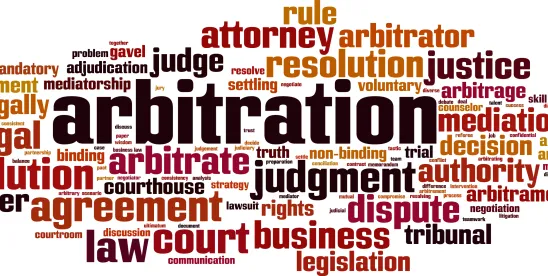Three recent Supreme Court Decisions—Coinbase v. Suski, Smith v. Spizzirri, and Bissonnette v. LePage Bakeries—based on consumer and employment disputes have resolved significant circuit splits over arbitration. These cases were all decided by a unanimous Court, with Justices Jackson, Sotomayor, and Roberts authoring the three opinions.
Supreme Court Considers Arbitrability Based on Conflicting Contracts
In Coinbase v. Suski (May 23, 2024), the Supreme Court held that where there is a conflict between one or more contracts between same parties regarding the arbitrability of a dispute, a court alone (and not the arbitrator) must decide which contract governs. The appeal arose from a sweepstakes dispute wherein the official rules of the sweepstakes conflicted with the defendant’s user agreement.
After the plaintiff consumers brought a class action in California federal court, the defendant sought a motion to dismiss based on an arbitration provision in the user agreement. The district court denied the defendant’s motion based on the forum selection clause in a contract detailing the sweepstakes’ rules. The Ninth Circuit affirmed, agreeing that the forum selection clause, which gave sole jurisdiction over sweepstakes-related disputes to California courts, superseded the arbitration provision in the user agreement.
In a unanimous decision, the Supreme Court agreed with the Ninth Circuit that courts, not arbitrators, must decide the threshold question of whether a subsequent agreement supersedes an arbitration provision, dismissing concerns that the holding would invite challenges to delegation clauses that empower arbitrators to decide disputes concerning arbitrability.
Prior to the decision in Suski, there was no precedent in the First Circuit addressing the question of who resolves conflicting dispute resolution clauses. However, the Court’s decision accords with the approach of the First Circuit to related questions.
In Biller v. S-H OpCo Greenwich Bay Manor, LLC (2020), the First Circuit held that for parties to agree to have an arbitrator decide gateway questions of arbitrability, they must do by “clear and unmistakable evidence,” safeguarding a court’s jurisdiction to decide questions of arbitrability. Similarly, in McKenzie v. Brennan (2021), the First Circuit held that the court holds the decision-making power to decide whether parties intend to arbitrate a dispute when a new contract between the parties does not contain a broad arbitration clause, but an earlier contract does.
District Courts May Not Dismiss Cases Referred to Arbitration Upon a Request to Stay
In Smith v. Spizzirri (May 16, 2024), the Supreme Court interpreted 9 U.S.C. § 3 to mean that when a district court finds that a contract compels arbitration and a party has requested a stay of court proceedings pending arbitration, the court lacks jurisdiction to dismiss the suit. Instead, the Supreme Court determined that a lower court must stay the proceedings until the dispute is resolved in arbitration or the dispute is brought back before the court.
The decision arose from a California class action alleging delivery drivers had been misclassified as independent contractors and denied required wages and paid leave. While the Ninth Circuit affirmed the lower court’s discretion to dismiss the action referred to arbitration on a motion by the defendant, the Supreme Court unanimously reversed and remanded. Spizzirri may be understood as the complement to an earlier decision also involving Coinbase, Coinbase v. Bielski (June 23, 2023) (see our prior alert here), which held that a district court must stay its proceedings while an interlocutory appeal on the question of arbitrability is ongoing.
The First Circuit (as well as the Fifth, Eighth, and Ninth Circuits) had previously held that a district court has discretion to either dismiss litigation without prejudice or stay the proceedings. Dismissal following a referral to arbitration provided plaintiffs with an opportunity to appeal that final, adverse ruling, with the Supreme Court’s decision now requiring plaintiffs to wait until the arbitration has been completed.
While the First Circuit has not yet passed a decision under following Spizzirri, a recent decision by the Rhode Island District Court may indicate how post-Spizzirri questions will be decided. In De Simone v. Citizens Bank (June 17, 2024) the court directly cited to Spizzirri to conclude that the proceedings in that case must be stayed pending arbitration. At the appellate level, the Ninth Circuit (which previously, like the First Circuit, held that courts have discretion to stay or dismiss) amended its opinion in Herrera v. Cathay Pacific Airways Ltd. (March 11, 2024; amended June, 24, 2024) to reflect the decision in Spizzirri, writing that “Spizzirri made clear that a district court does not have discretion to dismiss the action when granting a motion to compel arbitration under 9 U.S.C. § 3.”
Supreme Court Holds Workers in Any Industry May Benefit from Arbitration Exemption
In Bissonnette v. LePage Bakeries Park St. LLC (May 14, 2024), the Supreme Court unanimously held that the Federal Arbitration Act’s exemption for transportation workers at 9 U.S.C. § 1, which protects workers in foreign or interstate transportation from having their employment claims referred to mandatory arbitration, may apply to workers in any industry.
In LePage Bakeries, the defendant companies argued that baked goods delivery drivers were not protected from the exemption because they were not transportation industry employees. The district court and Second Circuit agreed, compelling arbitration of the parties’ dispute. The Supreme Court reversed, noting that the Second Circuit has created a transportation-industry requirement without any basis in the text of the statute.
The decision resolves a split among the First and Second Circuits in favor of workers seeking to bring class action claims. In two 2023 cases, Canales v. CK Sales Co. and Fraga v. Premium Retail Servs., Inc., the First Circuit explicitly rejected the Second Circuit’s reading of the Federal Arbitration Act that a worker must be employed in the transportation industry to benefit from the exemption to mandatory arbitration. Instead, the First Circuit focused on the worker’s role instead of the employer’s business, a test that the Supreme Court has now embraced. The Court’s decision follows New Prime, Inc. v. Oliveira (2019) and Southwest Airlines Co. v. Saxon (2023) wherein the Court held the exemption applies to independent contractors and airplane cargo loaders.
Recent Decisions Reflect Critical Questions on Jurisdiction Over Arbitration Disputes
The Supreme Court’s trio of unanimous arbitration decisions outline three areas in which district courts retain jurisdiction over arbitration disputes. The rulings reflect the outer limits of a multi-decade trend in which the Supreme Court has consistently issued arbitration-friendly decisions, encouraging the resolution of arbitrable matters without involving the courts.
It is likely that challenges to arbitrability based on conflicting contracts and transportation work will remain flashpoints in federal court litigation for years to come, with federal courts retaining jurisdiction over disputes referred to arbitration, hearing fewer appeals of orders compelling arbitration, and resolving matters that arise during those proceedings. The decisions serve as reminders to businesses that they should work with experienced counsel to draft and regularly review dispute resolution clauses in consumer and employment contracts to ensure that, if disputes do ultimately arise, they will be resolved via the intended procedure.
* * *
Thank you to firm summer associate Jonathan Tucker for his contribution to this post.



 />i
/>i

